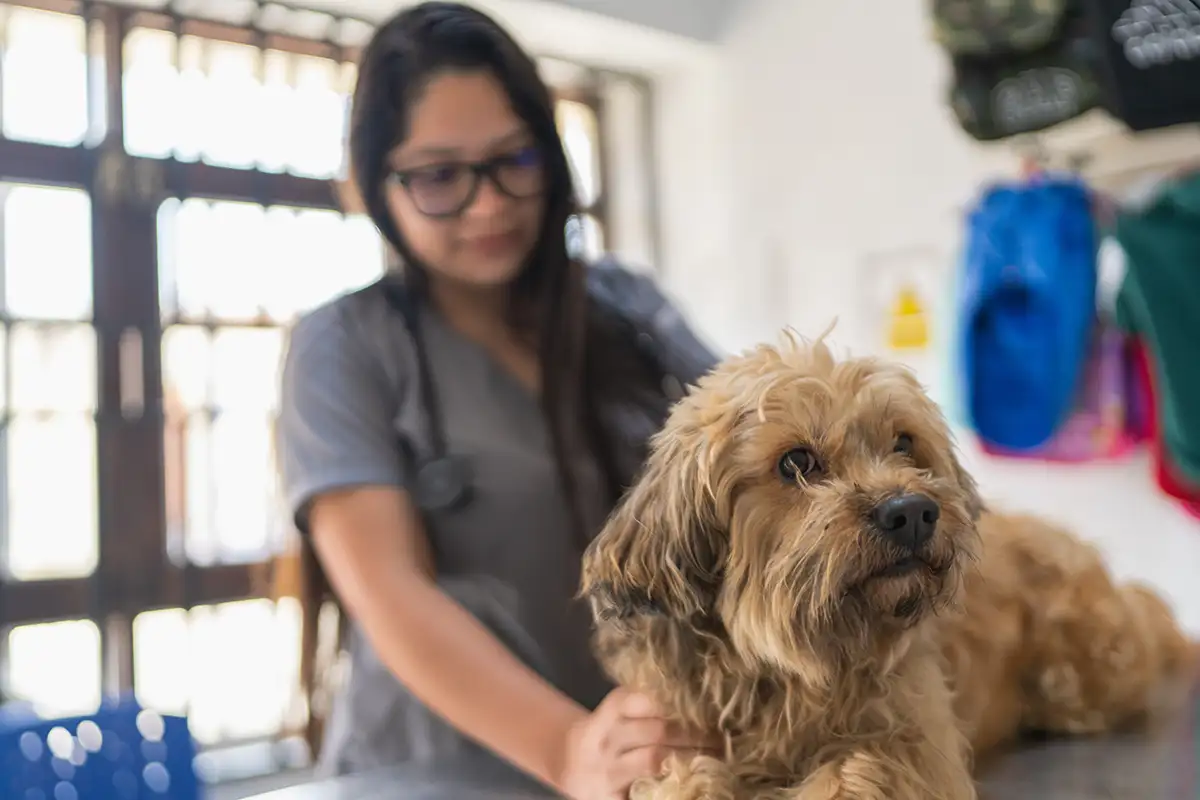
Control Dog OA Pain With Monthly, Long-Lasting Librela

Osteoarthritis (OA) Is a Serious Disease
Slowing down on walks, trouble with stairs, or hesitating to jump up aren’t just signs of dogs aging; they’re possible signs of OA, a serious disease with pain that hurts all the time if it’s not treated.1
- OA is a type of arthritis that happens when protective tissue in a dog's joints is worn down, which can even cause bones to rub against one another
- Dogs of all ages, sizes, and breeds can have OA pain—it's not just a condition seen in older dogs2
Approximately 75% of pet owners attribute changes in their dog’s behavior to aging when, in reality, they could be suffering from OA pain.3 Nearly 40% of all dogs show signs of OA pain, yet almost 50% remain undiagnosed.4,5
OA pain control for dogs shouldn’t wait—long-lasting OA pain control is possible with once-monthly Librela.
Take the dog OA pain quiz to learn more about the signs.

Librela Is Approved as Safe and Effective to Control OA Pain in Dogs6
Librela has gone through rigorous testing, and is approved by the Food and Drug Administration (FDA). Over 30 million doses of Librela have been distributed to veterinary offices with millions of dogs treated globally.7
Librela can have a positive impact on dogs currently suffering from OA pain.

Why Librela?
Librela is specifically designed to control OA pain for dogs:
- Librela is a disease-targeting treatment that impacts the root cause of OA pain and reduces pain signals, making it easier for dogs to move and play8-11
- Librela is different than other medications that control OA pain because it lasts for an entire month with just 1 injection, eliminating the need for daily pills for OA pain
Librela offers sustained OA pain control for dogs:
- In clinical studies, Librela was shown to control OA pain in dogs, which helped improve their mobility and overall quality of life10,11
- Although individual results vary, some dogs showed a decrease in signs of OA pain as soon as 7 days after the first injection; some dogs may not see the effects until after the second injection

Safety Considerations
Librela is safe for most dogs when used according to its FDA-approved labeling, but a conversation with your veterinarian is the best way to confirm that Librela is right for your dog. For example, Librela should not be used in dogs with a sensitivity to the active ingredient, bedinvetmab. Librela also shouldn't be used in dogs who are pregnant, breeding, or lactating.
The most common side effects that occurred in clinical studies in dogs taking Librela vs placebo (no medicine) were urinary tract infection, bacterial skin infection, dermatitis, and increased blood urea nitrogen (BUN).10,11*
Adverse events reported post-approval include ataxia (unsteady movements), anorexia (loss of appetite), lethargy (extreme tiredness), emesis (vomiting), and polydipsia (increased drinking).
Globally, adverse events have been reported post-approval at a rate of between 1 to 10 times per 10,000 doses distributed. No single category of adverse event has been reported at a rate higher than 10 times per 10,000 doses.
While we report all adverse events in full compliance with the law, we acknowledge that this information is imperfect, as reporting by pet owners and veterinarians is voluntary and we cannot confirm that all doses distributed have been administered, but it is the best post-approval indicator we or any other company has as to the actual rate of adverse events occurring.
*For the vast majority of dogs, an increase in BUN was not associated with kidney disease.

Vet-Approved Support
IMPORTANT SAFETY INFORMATION: See full Prescribing Information. Librela is for use in dogs only. Women who are pregnant, trying to conceive or breastfeeding should take extreme care to avoid self-injection. Hypersensitivity reactions, including anaphylaxis, could potentially occur with self-injection. Librela should not be used in breeding, pregnant, or lactating dogs. Librela should not be administered to dogs with known hypersensitivity to bedinvetmab. Adverse events reported post-approval include ataxia (lack of balance/coordination), anorexia (loss of appetite), lethargy (tiredness), emesis (vomiting), and polydipsia (increased drinking). The most common adverse events reported in a clinical study were urinary tract infections, bacterial skin infections and dermatitis (skin irritation/inflammation).
See the Client Information Sheet for more information about Librela.
- Lascelles BDX, Brown DC, Conzemius MG, Gill M, Oshinsky ML, Sharkey M. Measurement of chronic pain in companion animals: discussions from the Pain in Animals Workshop (PAW) 2017. Vet J. 2019;250:71-78. doi:10.1016/j.tvjl.2019.07.001
- Anderson KL, Zulch H, O’Neill DG, Meeson RL, Collins LM. Risk factors for canine osteoarthritis and its predisposing arthropathies: a systematic review. Front Vet Sci. 2020;7:200. doi:10.3389/fvets.2020.00220
- ZMR: Forward Group Canine Osteoarthritis Report Wave 3. Zoetis Inc; May 21, 2025.
- Wright A, Amodie DM, Cernicchiaro N, et al. Identification of canine osteoarthritis using an owner-reported questionnaire and treatment monitoring using functional mobility tests. J Small Anim Pract. 2022;63(8):609-618. doi:10.1111/jsap.13500
- ZMR: 2023 OA Landscape Wave 6 Analysis: Quantitative Results. Zoetis Inc; June 2023.
- Librela (bedinvetmab injection). Freedom of Information Summary. NADA 141-562. Zoetis Inc; May 2023.
- Zoetis data on file. June 2025.
- Keizer RJ, Huitema AD, Schellens JH, Beijnen JH. Clinical pharmacokinetics of therapeutic monoclonal antibodies. Clin Pharmacokinet. 2010;49(8):493-507. doi:10.2165/11531280
- Isola M, Ferrari V, Miolo A, et al. Nerve growth factor concentrations in the synovial fluid from healthy dogs and dogs with secondary osteoarthritis. Vet Comp Orthop Traumatol. 2011;24(4):279-284. doi:10.3415/VCOT-10-04-0051
- Corral MJ, Moyaert H, Fernandes T, et al. A prospective, randomized, blinded, placebo-controlled multisite clinical study of bedinvetmab, a canine monoclonal antibody targeting nerve growth factor, in dogs with osteoarthritis. Vet Anaesth Analg. 2021;48(6):943-955. doi:10.1016/j.vaa.2021.08.001
- Michels GM, Honsberger NA, Walters RR, Tena JKS, Cleaver DM. A prospective, randomized, double-blind, placebo-controlled multisite, parallel-group field study in dogs with osteoarthritis conducted in the United States of America evaluating bedinvetmab, a canine anti-nerve growth factor monoclonal antibody. Vet Anaesth Analg. 2023;50(5):446-458. doi:10.1016/j.vaa.2023.06.003


